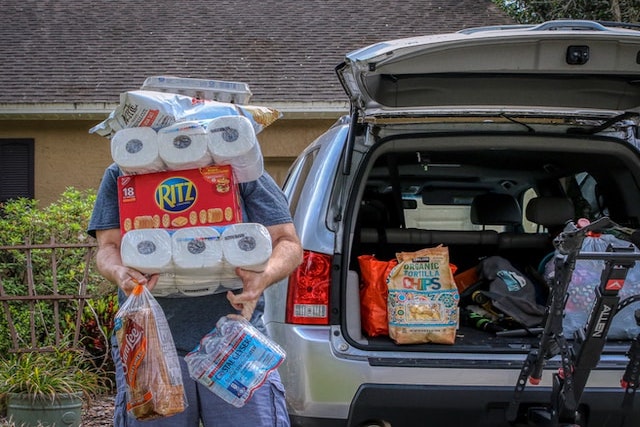We all love a bargain, and shopping at warehouse stores like Costco and Sam’s Club definitely cuts costs on groceries and household items. Diapers, pet food, paper products, detergent, vitamins—items such as these are certainly a way better deal at the big stores! But is everything a better deal at the warehouse stores? Not necessarily. Here are ten things you (generally) shouldn’t buy in bulk.
1. Produce
Fruits and vegetables don’t last too long, whether it’s the kind you store in the fridge or the kitchen counter. Even if buying a large amount of produce seems like a good deal, throwing out spoiled items at the end of the week is wasteful and not cost-effective. Buy fresh produce according to how much you use within a few days. Of course, if you are making French onion soup, do buy that big bag of onions at Costco! A friend of mine makes smoothies each morning for herself and her family, so fresh bananas and berries bought in bulk definitely saves them money.
2. Meat and Fish
Meat and fish at warehouse stores are not wrapped for freezer storage, and if kept too long can get freezer burn and tough to eat. And though the FoodSafety.gov says frozen meat kept at a temperature of 0° Fahrenheit or lower is “safe to eat indefinitely,” remember the difference between “safe to eat” and “good to eat.” While keeping some meat and fish in your freezer is handy for a quick meal, fresher is usually best.
3. Cooking Oils
Assess how long it takes you to finish a gallon of cooking oil—do you really finish it by the expiration date? Even if you do, NutritionFacts.org‘s study shows found that many cooking oils begin to go rancid and oxidize long before that date. Unless you do a lot of frying, get your oil at the grocery store instead. This way your cooking oils will always be fresh, and you can have regular-sized bottles of a wider variety, such as extra virgin olive oil, grapeseed oil, peanut oil, and coconut oil.
4. Nuts
Nuts are sooo tasty, whether you eat them by the handful or put them into salads and baked goods. They’re also not cheap, which is why it’s tempting to buy them in bulk. Keep in mind that they are prone to going rancid because of their fat content, especially if your kitchen is on the warmer side. If you really wish to buy nuts in bulk, stash a small amount in an airtight container and keep in a cool, dark place—while the rest is stored in the freezer.
5. Flour
Unless you do a huge amount of baking, buying a 25- or 50-lb. bag of flour is not the best idea. Flour attracts water, and is prone to going rancid. All-purpose flour has a longer shelf life (up to six months) but keeping it that long in your pantry puts it at risk for an infestation of weevils (aka “flour bugs”). You do not want this. Your best bet is the 5-lb. bag of flour, which always seem to be on sale anyway.
6. Whole Grains and Brown Rice
Brown rice and whole grains (such as quinoa, oatmeal, popcorn) are full of natural oils, also making them susceptible to rancidity and weevils. Buy just enough so you can replenish every couple of months.
7. Condiments and Dressings
Hosting a big barbecue? Then it makes sense to get those giant bottles and jars of ketchup, mustard, BBQ sauce, relish, and mayonnaise. For your regular consumption, stick with the regular sizes from the grocery store. Same goes for salad dressings and marinades. Besides, these all need cold storage and those huge containers would take up so much valuable real estate in your refrigerator. But if you have a 5-year old who won’t eat any vegetable without Ranch dressing, get the Costco bottle.
8. Herbs and Spices
Dried herbs and spices begin losing their flavor and potency by six months. It makes the most sense to get these at the grocery store, and only buy in bulk the few you use all the time. Look at your herbs and spices—the ones you keep up front you could probably get in bulk; the ones in the back…nope. Pro tip: Always store herbs and spices in a cupboard or pantry, and not by the stove—the humidity, heat, and light will quash their flavor even quicker.
9. Skincare
Most skincare products have a shelf life of 6 months to one year once the seal has been broken. So a giant jar or face cream that you won’t use up in a year? Skip it. But a 3-pack of that same face cream in smaller jars? Go for it. Store the sealed, unused ones in a cool, dry place.
10. Sweets and Snacks
We only add these items because they are usually a “want” and not a “need”. For most of us trying to keep track of our health, having a giant container of peanut M&Ms or a small sack of Ruffles potato chips are temptations too hard to resist! If you’ve got amazing self-discipline or the metabolism of a teen (we are sooo jealous right now), then don’t worry about it.
One major bonus of not buying everything at a warehouse store is more space in your home to accommodate the items that do make sense for you to buy in bulk! Every household has different needs and functions differently, of course, so use our guidelines according to your lifestyle. Not sure about a specific food? Check out Still Tasty and search for almost any food item!

